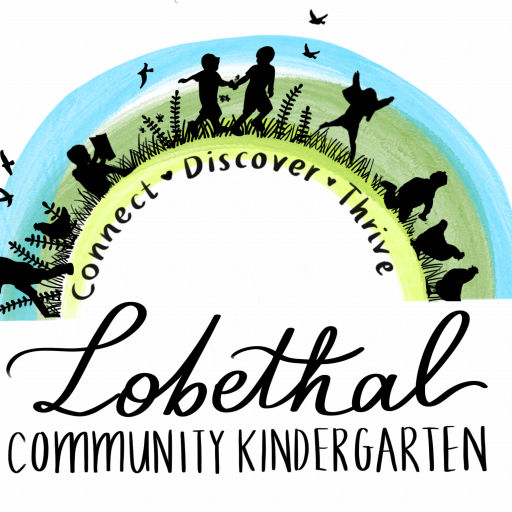We like to use the words ‘sustainability progress’ rather than focus, as our intention is to always strive to keep moving forward in our sustainability practices. Our Quality Improvement Plan review highlighted the importance of prioritising sustainability practices within our kindergarten. This required learning, understanding and commitment by staff, children and their families. The goal is that our sustainability practices will help us strengthen connections with our local schools & community.
CLEANING THE SITE
Environmental sustainability practices are embedded in everyday play and experiences for the children at Lobethal Kindergarten. The year began with a need to improve visibility to all outdoor play spaces including the mud kitchen. The prunings were too large for the green kerbside waste bin. A local farmer was called, and he brought his trailer to kindy for the children to load the branches in to feed to his cows.
GROWING VEGETABLES
We have raised garden beds and large pots for growing vegetable produce throughout the year, and fruit trees in the side garden beds. The children are involved in caring for the plants. This involves planting the seeds and seedlings, watering, fertilizing, harvesting, cooking and eating, through to removing the old plants and loading up the green waste bin for composting. The excess produce the children can’t eat is shared in the Community Grow Free cart for families to access.
COMPOSTING
2021 saw the resurrection of a kindy worm farm, and the introduction of our own compost tumbler that is small enough for children to turn. The goal is to fertilize the garden beds & pots that continue to provide the kindy community with produce. Each day children appropriately place their left-over food scraps into either a chook or worm bucket or a compost bucket for the tumbler to minimise food wastage into the large green bin. They have learned which foods chooks and worms can eat, and which foods are great for the compost tumbler.
RAISING CHOOKS
The kindy chooks are a friendly, interactive, exciting part of our sustainability practices, exposing the children to the responsibility of providing feed and water to them. The eggs are collected daily and used in cooking, which is a large part of the curriculum. Excess eggs are placed in the Community Grow Free Cart. Extra excitement fills the kindy leading up to Easter when the hens go broody, and the anticipation of counting down 21 days for eggs to hatch out little chickens.
CARTRIDGE RECYCLING
We have connected with two local schools to enhance our sustainability practices. Lobethal Primary School have shared a recycling bag from ‘Close the Loop’ for collecting cartridges from printers. We invite the wider community to bring their cartridges to us as a recycling collection point.
CONNECTIONS WITH OTHER SCHOOLS
A connection has been established with Lenswood Primary School with their own Youth Environmental Student Leaders. The Kindergarten children are viewed as leaders. They share their knowledge with the school students of the sustainability practices within the kindy regarding sorting waste in to compost, rubbish, recycling and soft plastics.
ANIMAL CONSERVATION
The relationship with Lenswood Primary School is reciprocal. They have an established Bee, Butterfly & Frog Native Garden. We had a vision to attract more native butterflies to our yard, and we now have a successful Monarch Butterfly breeding program with established Swan and Buddleia plants. Cuttings and seeds were sourced from Lenswood Primary School, followed by propagation at a shared site during Sustainability Day celebrating Outdoor Classroom Day.
RESPONSIBLE WATER USAGE
Outdoor play at our kindy is often messy, involving gardening, sandpit, digging patch and a mud kitchen. We collect water from the shed roof into a rain water tank and use this water for children’s play areas. Our children are taught about the sustainability practices of using water responsibly.
SOFT PLASTICS RECYCLING
Soft plastic recyclings involved travelling to Coles or Woolworths as a collection point. Following contact with our local Lobethal Klose’s Foodland explaining the effort of the children’s soft plastic recycling, they have agreed to be a collection point for us to deliver to. Klose’s supermarkets are now intending to provide a collection point for the whole community to deliver their soft plastics. We are very proud of this community connection.
Plastic and bread tag collection has been encouraged within our Kindergarten community. We had already been collecting, but we didn’t have a contact to ensure the recycling efforts were transformed through to processing. Links with Lenswood Youth Environmental Student Leaders have connected us to a collection point at Lenswood Primary School. The hard plastic lids and bread tags are collected and delivered to be recycled into mobility aids.
SUSTAINABILITY AT HOME
Supporting and encouraging our staff, families and children to be environmentally aware is an embedded part of our learning. We provide information to children and families to prompt discussions and help them make more environmentally friendly decisions in their day to day lives, including packing lunchboxes that produce little to no waste. Part of this learning includes waste audits to raise all of our awareness about how much non recyclable waste we produce, and to be able to try and work out ways to reduce this.
OUR WASTE AUDIT
A full kindy waste audit highlighted the amount of soft plastic waste our daily toast program was producing. We approached the Lobethal Bakery to help us find a solution to this. We now have their support in receiving bread for our program which they package into recyclable paper bags for us. We strive to work together with our local community to build lasting reciprocal relationships that foster a sense of environmental sustainability stewardship across all generations, and a sense of working together for a common good.
